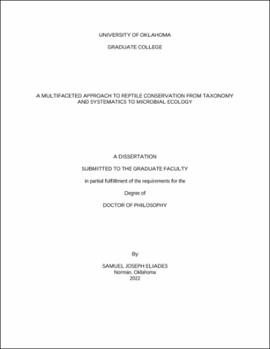| dc.description.abstract | Roughly one in five reptile species globally is threatened with extinction as of 2022. Further, nearly 15% of described reptile species are considered Data Deficient by the IUCN and their conservation status has not yet been evaluated. Many of the world’s 11,500+ known reptile species are in dire need of protection and others must first be described in the scientific literature to assess initial threats and potential conservation needs. For my dissertation research, I aim to contribute to ongoing reptile conservation efforts from several different angles. First, I help to better document the world’s reptile biodiversity by describing novel species of geckos from the Philippines. Next, I examine gut microbial ecology in Philippine gekkonids to evaluate the roles of ecoevolutionary forces in shaping host-associated microbiomes. Finally, I study microbial compositions in two different reptile conservation translocation programs to determine how microbiomes respond following host introduction to novel, wild habitats. These studies expand our understanding of reptile biodiversity and help to improve methodologies used for applied reptile conservation.
In Chapter One, I use museum vouchered specimens to study a little-known group of geckos from the Philippines, Scaly-toed geckos of the genus Lepidodactylus. I use both morphological and molecular tools to analyze hundreds of gecko specimens collected throughout the Northern Philippines. In doing so, I identify four new species of Scaly-toed geckos and describe them formally in the scientific literature. I highlight remaining taxonomic uncertainties in the L. yami-balioburius clade and stress the need for additional studies to better understand Lepidodactylus diversity in the region. The description of these four species adds to our understanding of Philippine herpetofaunal biodiversity and lays the groundwork for future threat-assessments to evaluate the status of these previously unknown lizards.
In Chapter Two, I examine host-associated gut microbial communities in multiple gekkonid genera and species, with implications on the adaptive capacity of Philippine gekkonids to changing landscapes. I use cloacal samples collected in the field from nine gecko species to better understand the ecoevolutionary forces that influence gut microbial assemblages and whether historical or contemporary factors may shape such compositions. I identify microbial assemblages specific to each host species and note marked variation among conspecifics at distinct sampling sites, indicating that host locality influences gut microbiomes strongly. I document an interesting trend where individuals grouped as widespread and microendemic in their range tendencies regardless of host species identity display significant differences in alpha and beta diversity metrics examined. Such findings suggest certain species may have differing adaptive capacities to persist in novel or altered habitats.
In Chapter Three, I use these same microbial ecology tools to assess how gut microbial communities in both captive and wild Fijian crested iguanas (Brachylophus vitiensis) differ and how microbiomes respond in captive-reared hosts (e.g. those raised ex-situ in conservation-based facilities) after they are released into the wild. I use both cloacal swabs and fecal samples to establish an initial understanding of gut microbiomes in this IUCN Critically Endangered species. I find significant differentiation in gut microbial community composition and structure between captive and wild iguanas in both sampling schemes. Two months after captive-reared animals are released from captivity to native habitat, I show that microbial communities recovered from cloacal samples closely resemble wild counterparts. Microbial communities in fecal samples from these same individuals, however, remain significantly distinct from wild conspecifics. Interestingly, we also collected fecal samples from lizards reintroduced two years prior and which show microbiomes indistinguishable from those in wild lizards. These results indicate that captive upbringings can lead to differences in microbial assemblages in captive-reared iguanas compared to wild individuals and such differences may persist for a time even after host reintroduction. This investigation highlights the necessity of continuous monitoring of reintroduced animals in the wild to ensure successful acclimatization after release.
Finally in Chapter 4, I again evaluate microbial compositions in reptiles from a reintroduction and translocation program. I analyze fecal samples from Texas horned lizards (Phrynosoma cornutum) raised at the Oklahoma City Zoo and Botanical Garden and released onto Tinker Air Force Base. I do this to identify differences in gut microbial communities between captive-reared and wild lizards and to assess whether gut microbiota in reintroduced Texas horned lizards shift to closely resemble wild counterparts following release. Within three months of reintroduction, translocated Texas horned lizard microbiomes were substantially more similar to wild counterparts than they were while housed in captivity. These results suggest reintroduced animals from captive-rearing and release programs have the capacity to rapidly alter gut microbiota to mirror microbiomes found in naturally occurring host populations. This study offers promising signs for the plasticity of microbiomes in reintroduced hosts and lays important foundations for continued evaluations of microbiomes and their impacts on an animal translocation program. | en_US |
